Citroen C4 CACTUS 2016 1.G Workshop Manual
Manufacturer: CITROEN, Model Year: 2016, Model line: C4 CACTUS, Model: Citroen C4 CACTUS 2016 1.GPages: 308, PDF Size: 7.96 MB
Page 51 of 308
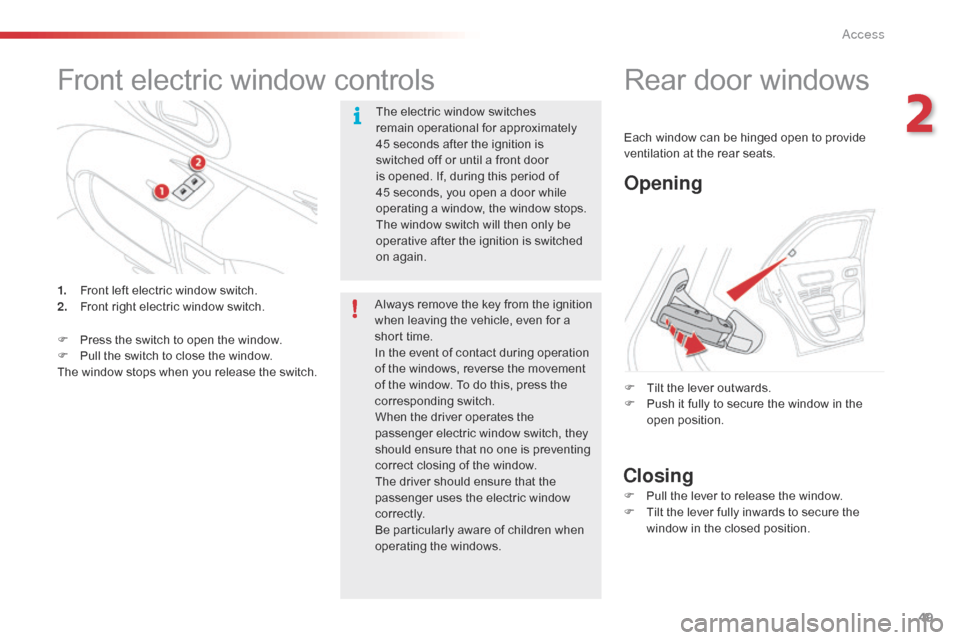
49
Front electric window controls
The electric window switches remain operational for approximately
4
5 seconds after the ignition is
s
witched off or until a front door
i
s opened. If, during this period of
4
5 seconds, you open a door while
o
perating a window, the window stops.
T
he window switch will then only be
o
perative after the ignition is switched
o
n again.
1.
F
ront
left
electric
window
switch.
2.
F
ront
right
electric
window
switch.
F
P
ress
the
switch
to
open
the
window.
F
P
ull
the
switch
to
close
the
window.
The
window
stops
when
you
release
the
switch. Always
remove the key from the ignition
w
hen leaving the vehicle, even for a
s
hort time.
In
the event of contact during operation
o
f the windows, reverse the movement
o
f the window. To do this, press the
c
orresponding
s
witch.
When
the driver operates the
p
assenger electric window switch, they
s
hould ensure that no one is preventing
c
orrect closing of the window.
The
driver should ensure that the
p
assenger uses the electric window
c
o r r e c t l y.
Be
particularly aware of children when
o
perating
t
he
w
indows.
Rear door windows
Opening
Closing
F Tilt the lever outwards.
F P ush it fully to secure the window in the
ope
n
p
osition.
F
P
ull the lever to release the window.
F
T
ilt the lever fully inwards to secure the
w
indow in the closed position.
Each
window can be hinged open to provide
v
entilation at the rear seats.
2
Access
Page 52 of 308
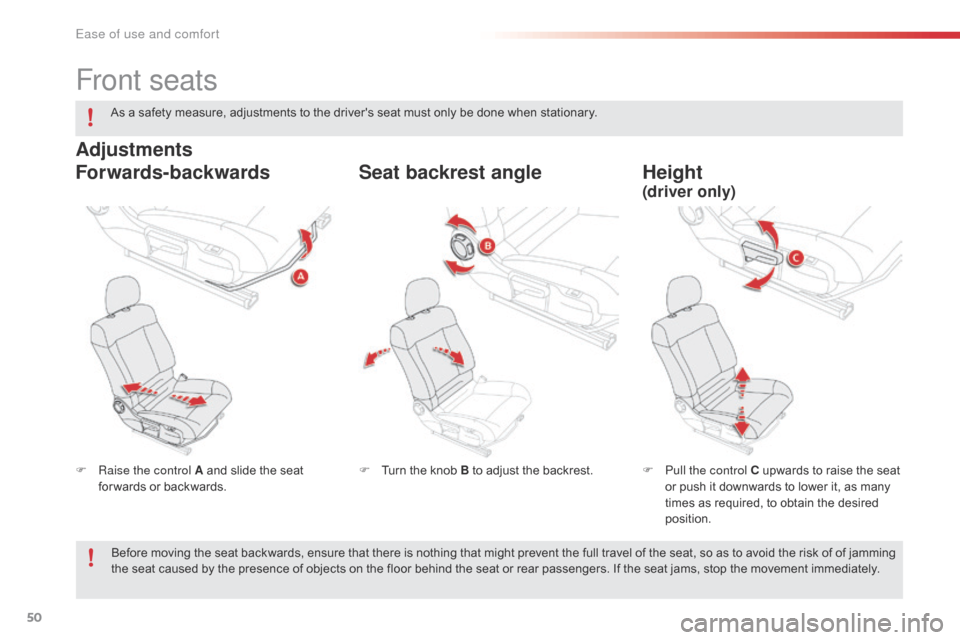
50
Front seats
F Raise the control A and slide the seat f
or wards or backwards. F
P ull the control C upwards to raise the seat o
r push it downwards to lower it, as many
t
imes as required, to obtain the desired
p
osition.
F
T urn the knob B to adjust the backrest.
Forwards-backwards
Height
Seat backrest angle
Adjustments
(driver only)
As a safety measure, adjustments to the driver's seat must only be done when stationary.
B efore moving the seat backwards, ensure that there is nothing that might prevent the full travel of the seat, so as to avoid the risk of of jamming
t
he seat caused by the presence of objects on the floor behind the seat or rear passengers. If the seat jams, stop the movement immediately.
Ease of use and comfort
Page 53 of 308
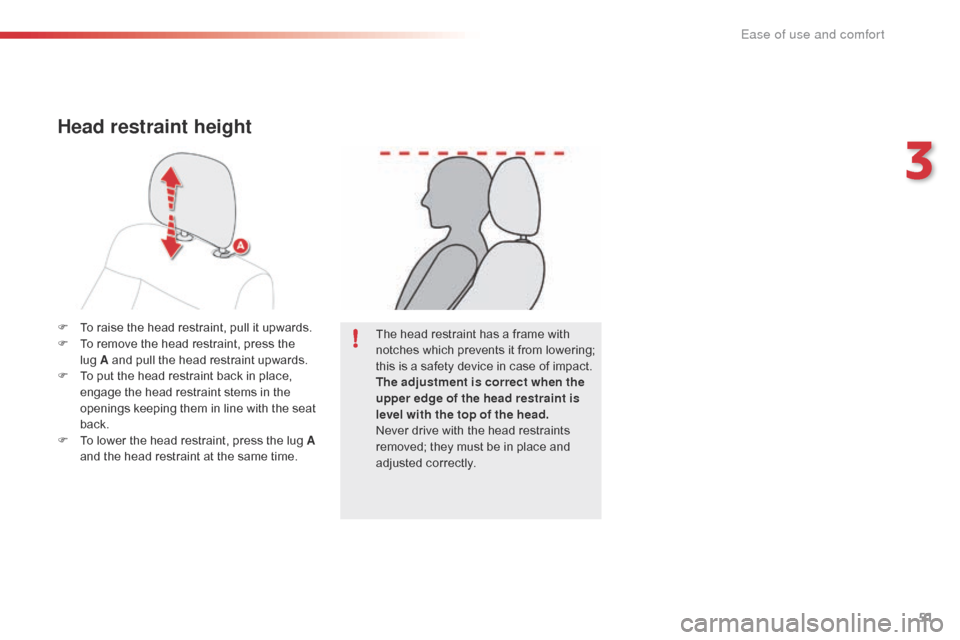
51
F To raise the head restraint, pull it upwards.
F T o remove the head restraint, press the
lug
A and pull the head restraint upwards.
F
T
o put the head restraint back in place,
e
ngage the head restraint stems in the
o
penings keeping them in line with the seat
b
ack.
F
T
o lower the head restraint, press the lug A
and
the head restraint at the same time.The
head restraint has a frame with
n
otches
which
prevents
it
from
lowering;
t
his is a safety device in case of impact.
The adjustment is correct when the
upper edge of the head restraint is
level with the top of the head.
Never
drive with the head restraints
r
emoved; they must be in place and
adj
usted
c
orrectly.
Head restraint height
3
Ease of use and comfort
Page 54 of 308
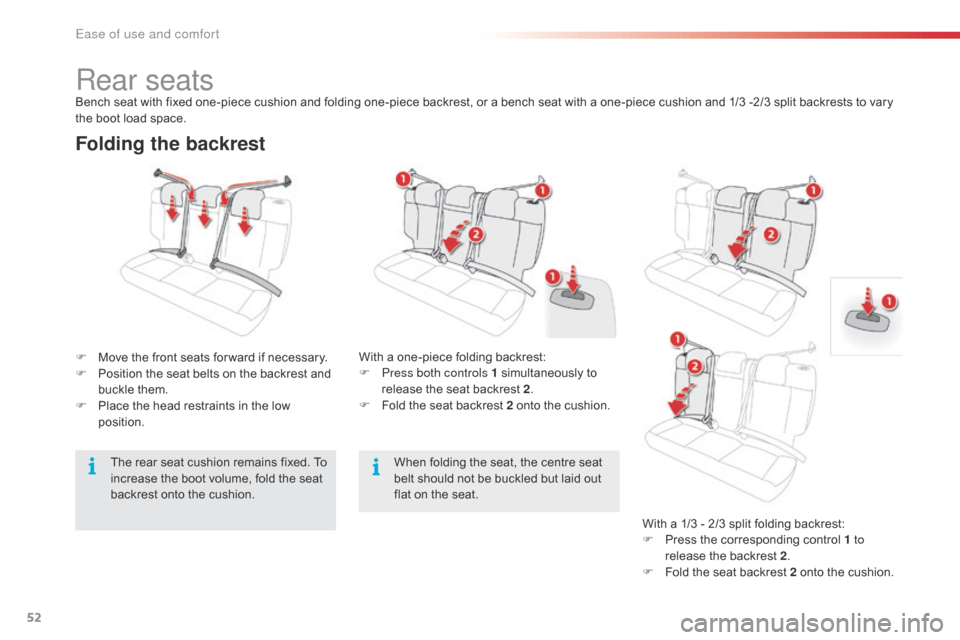
52
Folding the backrest
F Move the front seats for ward if necessary.
F P osition the seat belts on the backrest and
b
uckle them.
F
P
lace the head restraints in the low
p
osition. With
a one-piece folding backrest:
F P ress both controls 1 simultaneously to
r
elease the seat backrest 2.
F
F
old the seat backrest 2 onto the cushion.
Rear seatsBench seat with fixed one-piece cushion and folding one-piece backrest, or a bench seat with a one-piece cushion and 1/3 -2/3 split backrests to vary the boot load space.
When
folding the seat, the centre seat
b
elt should not be buckled but laid out
f
lat on the seat.With
a 1/3 - 2/3 split folding backrest:
F
P
ress the corresponding control 1 to
release
the backrest 2.
F
F
old the seat backrest 2 onto the cushion.
The
rear seat cushion remains fixed. To
i
ncrease the boot volume, fold the seat
b
ackrest onto the cushion.
Ease of use and comfort
Page 55 of 308
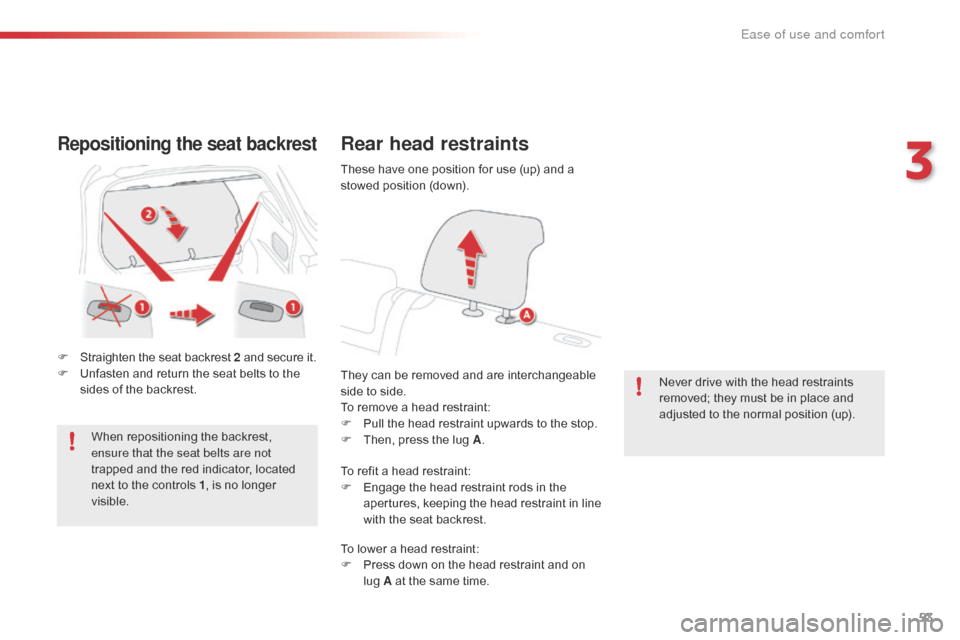
53
Repositioning the seat backrest
F Straighten the seat backrest 2 and secure it.
F U nfasten and return the seat belts to the
s
ides of the backrest.
When
repositioning the backrest,
e
nsure that the seat belts are not
trapped
and the red indicator, located
n
ext to the controls 1,
is no longer
vis
ible.
Rear head restraints
They can be removed and are interchangeable side to side.
To
remove a head restraint:
F
P
ull the head restraint upwards to the stop.
F
T
hen, press the lug A. Never
drive with the head restraints
r
emoved; they must be in place and
a
djusted to the normal position (up).
These
have one position for use (up) and a
s
towed position (down).
To refit a head restraint:
F
E
ngage the head restraint rods in the
a
pertures,
k
eeping
t
he
h
ead
r
estraint
i
n
l
ine
w
ith the seat backrest.
To
lower a head restraint:
F
P
ress down on the head restraint and on
l
ug A at the same time.
3
Ease of use and comfort
Page 56 of 308
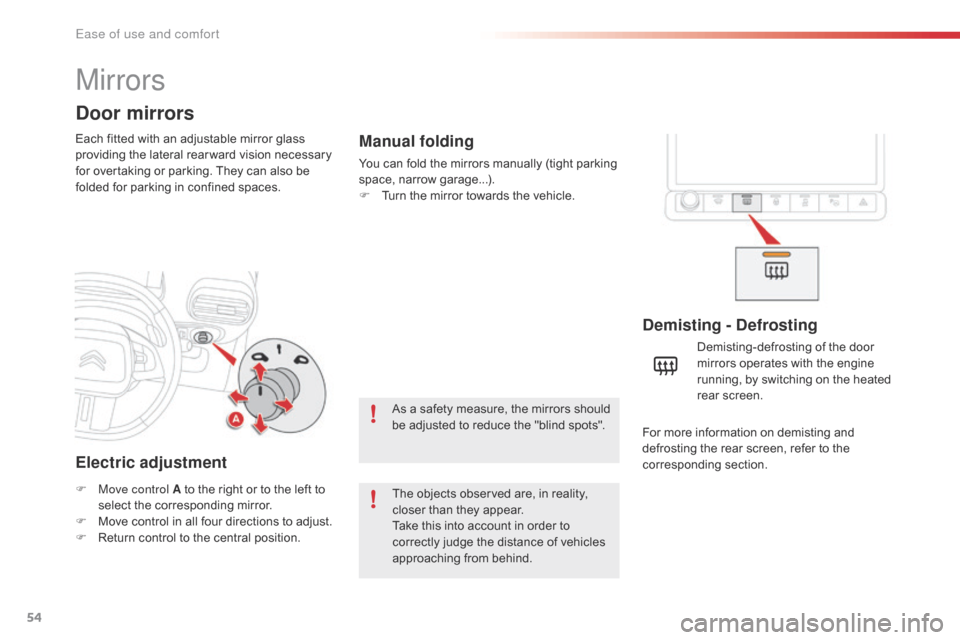
54
Mirrors
Each fitted with an adjustable mirror glass providing the lateral rear ward vision necessary
f
or overtaking or parking. They can also be
f
olded for parking in confined spaces.
Door mirrors
Demisting - Defrosting
F Move control A to the right or to the left to s
elect the corresponding mirror.
F
M
ove control in all four directions to adjust.
F
R
eturn control to the central position. Demisting-defrosting
of the door
m
irrors operates with the engine
r
unning, by switching on the heated
re
ar
sc
reen.
Electric adjustment
The objects observed are, in reality, c
loser than they appear.
Take
this into account in order to
c
orrectly judge the distance of vehicles
a
pproaching from behind.
Manual folding
You can fold the mirrors manually (tight parking space, nar row g arage...).
F
T
urn the mirror towards the vehicle.
As
a safety measure, the mirrors should
b
e adjusted to reduce the "blind spots".For
more information on demisting and
d
efrosting the rear screen, refer to the
c
orresponding
s
ection.
Ease of use and comfort
Page 57 of 308
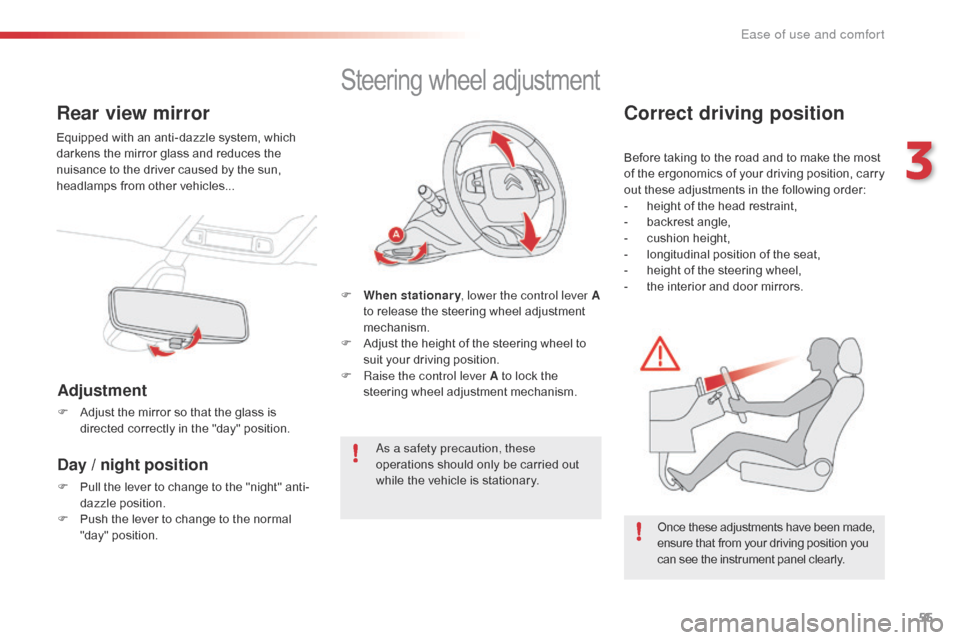
55
Rear view mirror
Equipped with an anti-dazzle system, which darkens the mirror glass and reduces the
n
uisance to the driver caused by the sun,
h
eadlamps from other vehicles...
Adjustment
F Adjust the mirror so that the glass is d
irected correctly in the "day" position.
Day / night position
F Pull the lever to change to the "night" anti-
dazzle position.
F
P
ush the lever to change to the normal
"
day" position.
Steering wheel ad justment
F When stationary , lower the control lever A
to release the steering wheel adjustment
m
echanism.
F
A
djust the height of the steering wheel to
s
uit your driving position.
F
Ra
ise the control lever A to lock the
s
teering wheel adjustment mechanism.
As a safety precaution, these
operations
should only be carried out
w
hile the vehicle is stationary.
Correct driving position
Before taking to the road and to make the most of t he e rgonomics o f y our d riving p osition, c arry
o
ut these adjustments in the following order:
-
h
eight of the head restraint,
-
b
ackrest angle,
-
c
ushion height,
-
l
ongitudinal position of the seat,
-
h
eight of the steering wheel,
-
t
he interior and door mirrors.
Once
these adjustments have been made,
e
nsure that from your driving position you
c
an see the instrument panel clearly.
3
Ease of use and comfort
Page 58 of 308
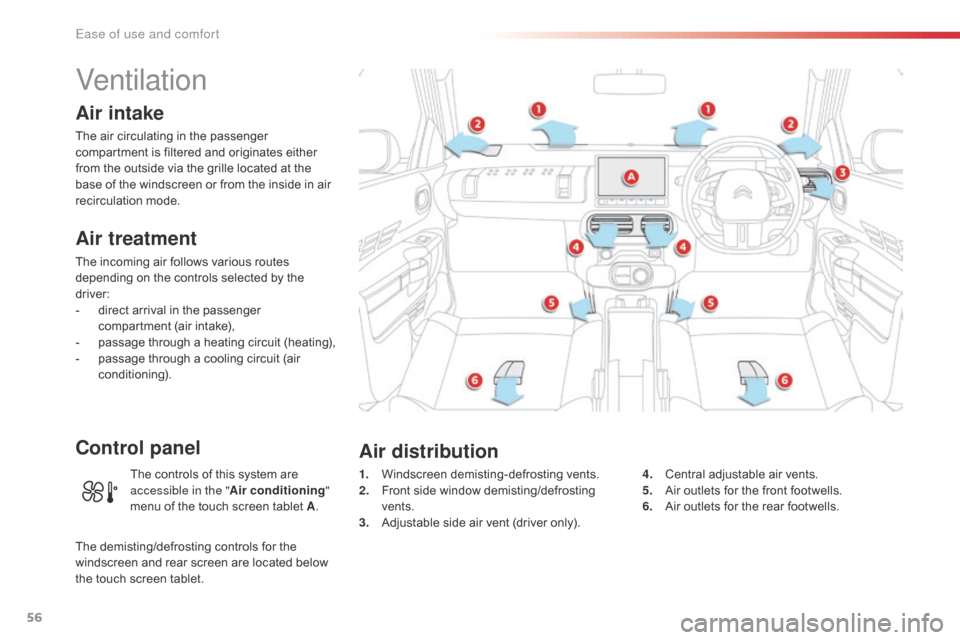
56
Ventilation
Air intake
The air circulating in the passenger compartment is filtered and originates either
f
rom the outside via the grille located at the
b
ase of the windscreen or from the inside in air
re
circulation
m
ode.
Air treatment
The incoming air follows various routes depending on the controls selected by the
d
river:
-
d
irect arrival in the passenger
c
ompartment (air intake),
-
p
assage through a heating circuit (heating),
-
p
assage through a cooling circuit (air
c
onditioning).
Control panel
1. Windscreen d emisting-defrosting v ents.
2. F ront side window demisting/defrosting
ve
nts.
3.
A
djustable side air vent (driver only).4. C
entral adjustable air vents.
5. A ir outlets for the front footwells.
6.
A
ir outlets for the rear footwells.
Air distribution
The controls of this system are accessible in the " Air conditioning "
menu
of the touch screen tablet A.
The
demisting/defrosting controls for the
w
indscreen and rear screen are located below
t
he
touch
screen tablet.
Ease of use and comfort
Page 59 of 308
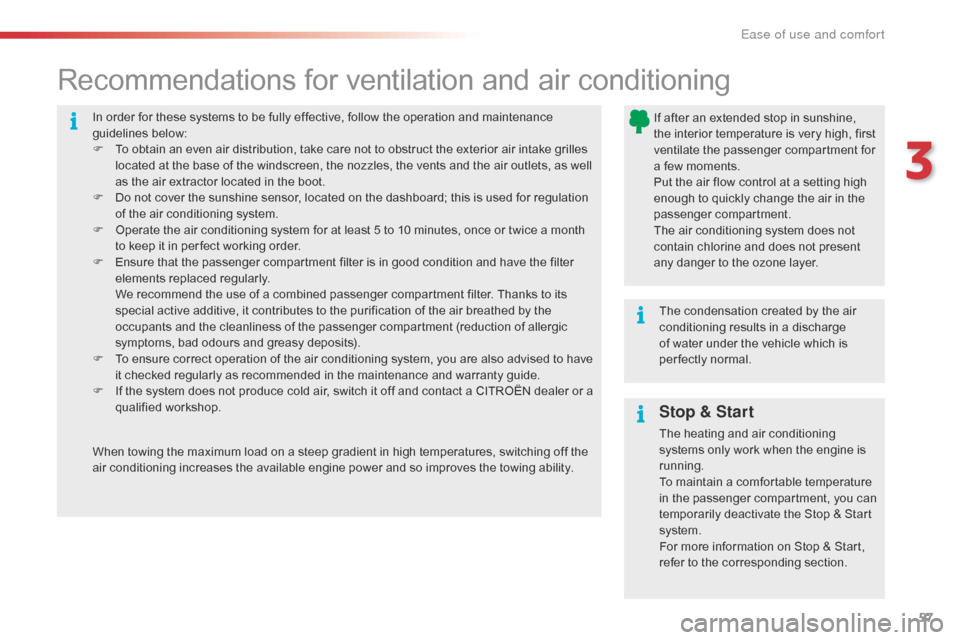
57
In order for these systems to be fully effective, follow the operation and maintenance guidelines belo w:
F
T
o obtain an even air distribution, take care not to obstruct the exterior air intake grilles
l
ocated at the base of the windscreen, the nozzles, the vents and the air outlets, as well
a
s the air extractor located in the boot.
F
D
o not cover the sunshine sensor, located on the dashboard; this is used for regulation
o
f the air conditioning system.
F
O
perate the air conditioning system for at least 5 to 10 minutes, once or twice a month
t
o keep it in per fect working order.
F
E
nsure that the passenger compartment filter is in good condition and have the filter
e
lements replaced regularly.
W
e recommend the use of a combined passenger compartment filter. Thanks to its
s
pecial active additive, it contributes to the purification of the air breathed by the
o
ccupants and the cleanliness of the passenger compartment (reduction of allergic
s
ymptoms, bad odours and greasy deposits).
F
T
o ensure correct operation of the air conditioning system, you are also advised to have
i
t checked regularly as recommended in the maintenance and warranty guide.
F
I
f the system does not produce cold air, switch it off and contact a CITROËN dealer or a
q
ualified
w
orkshop.
Recommendations for ventilation and air conditioning
If after an extended stop in sunshine, the i nterior t emperature i s v ery h igh, f irst
v
entilate the passenger compartment for
a
few moments.
Put
the air flow control at a setting high
e
nough to quickly change the air in the
p
assenger
c
ompartment.
The
air conditioning system does not
c
ontain chlorine and does not present
a
ny danger to the ozone layer.
The
condensation created by the air
c
onditioning results in a discharge
o
f water under the vehicle which is
p
er fectly normal.
When
towing
the
maximum
load
on
a
steep
gradient
in
high
temperatures,
switching
off
the
a
ir
conditioning
increases
the
available
engine
power
and
so
improves
the
towing
ability.
Stop & Start
The heating and air conditioning s ystems only work when the engine is
r
unning.
To
maintain a comfortable temperature
i
n the passenger compartment, you can
t
emporarily deactivate the Stop & Start
s
ystem.
For
more information on Stop & Start,
r
efer to the corresponding section.
3
Ease of use and comfort
Page 60 of 308
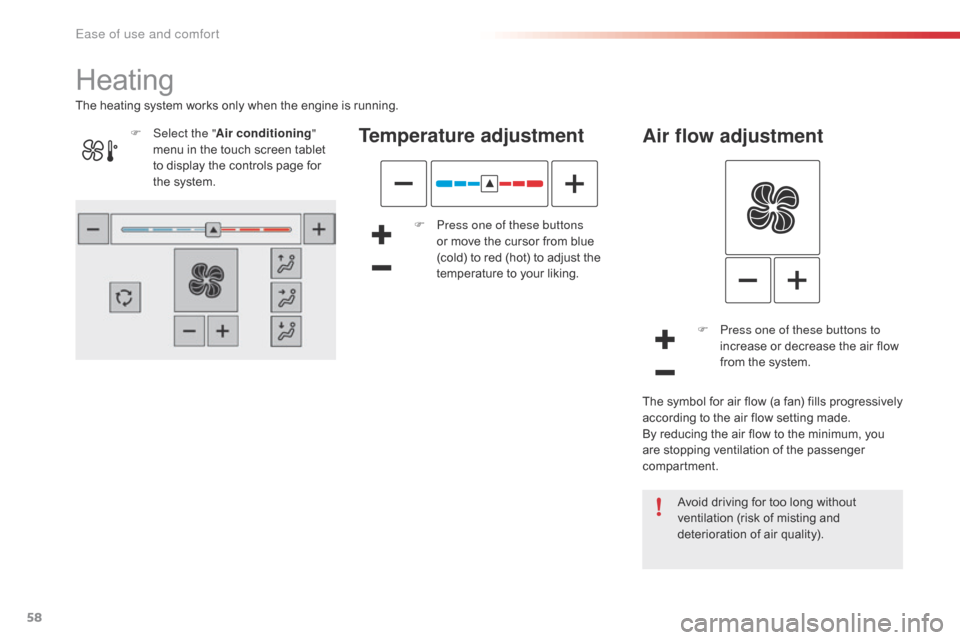
58
Heating
Temperature adjustment
F Press one of these buttons or move the cursor from blue
(
cold) to red (hot) to adjust the
t
emperature to your liking.
Air flow adjustment
F Press one of these buttons to increase or decrease the air flow
f
rom the system.
Avoid
driving for too long without
v
entilation (risk of misting and
d
eterioration of air quality).
The
heating
system
works
only
when
the
engine
is
running.
The
symbol for air flow (a fan) fills progressively
a
ccording
to the air flow setting made.
By
reducing the air flow to the minimum, you
a
re
stopping ventilation of the passenger
c
ompartment.
F
Sel
ect the "
Air conditioning "
menu
in
the
touch
screen
tablet
t
o
display
the
controls
page
for
t
he
system.
Ease of use and comfort